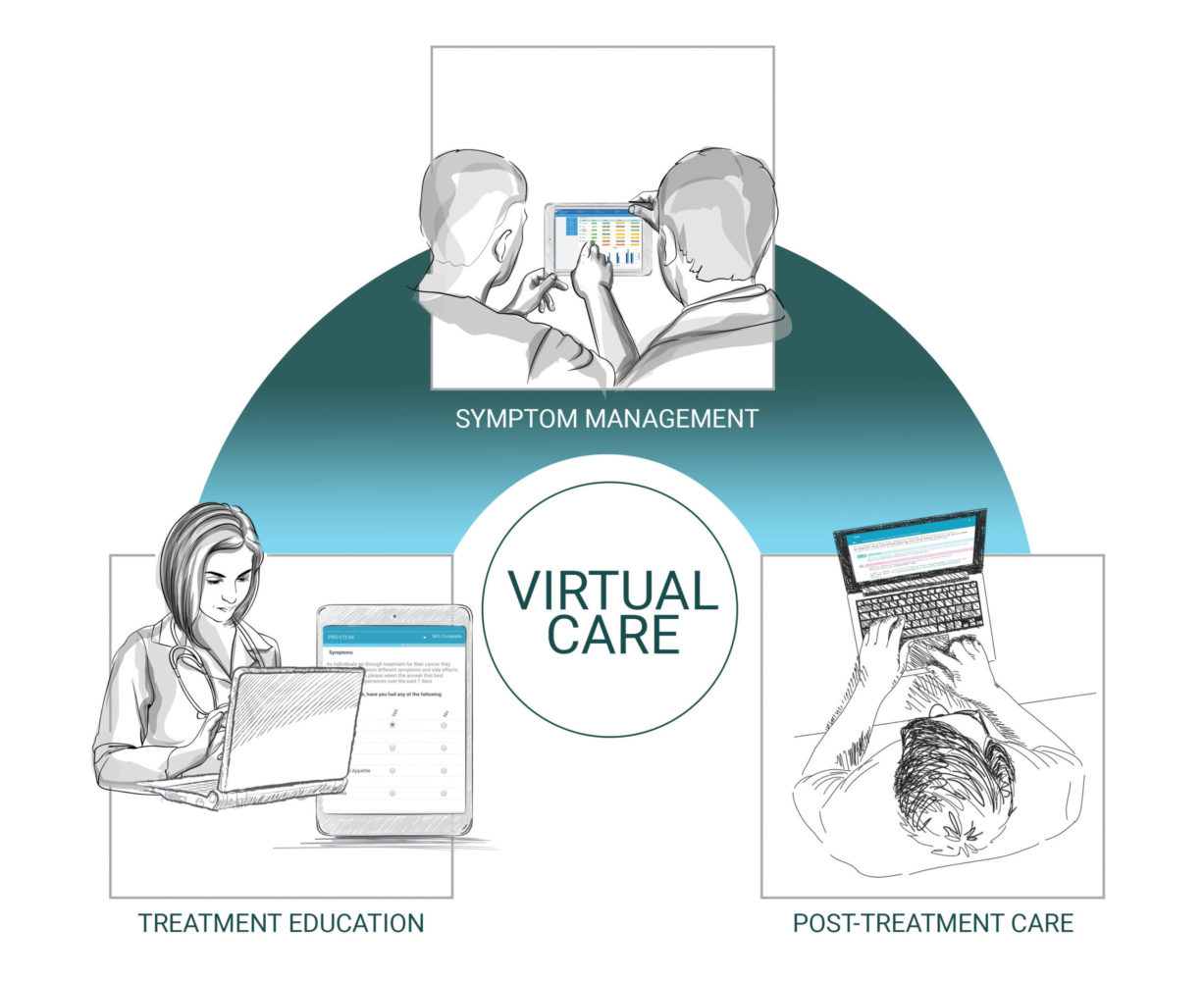
Patient Engagement with Carevive PROmpt® Virtual Care
Carevive began rolling out the electronic patient experience, Carevive PROmpt® in 2018, and has integrated symptom alerts with the EMR for patient safety and ease of use of the care team.
Getting patients to use our virtual cancer care technology has been much easier than expected. Frankly, we expected more resistance, but with an easy-to-use system, remote symptom monitoring and patient management program makes it incredibly easy for patients to stay connected with their care teams from wherever they are.
Patients enrolled receive weekly notifications via email and/or text message, prompting them to complete brief surveys about their cancer symptoms and treatment experiences. Patients can complete these surveys from their smartphone or any other digital device or computer. The response has been remarkable, with 80% of patients routinely self-reporting their symptoms each week—a compliance rate much higher than the industry average. Cancer care teams remotely monitor these electronic patient-reported outcomes (ePROs) and intervene whenever the Carevive PROmpt’s preset algorithms identify concerns.
Carevive PROmpt’s thoughtful and purposeful approach has proven to remove barriers to patient care, improve the efficiency of care team workflows, and facilitate truly patient-centered care.
Even before the coronavirus pandemic, remote or virtual care was an essential part of patient-centered care. Addressing the needs of patients with cancer while they are in their home environments leads to better patient outcomes, improves care efficiencies, and helps patients and healthcare systems manage costs.
Traditionally, care teams took a reactive approach to address patient needs. Patients were typically instructed to call a nurse coordinator or triage nurse to report new or worsening symptoms or obstacles they faced in complying with their care plan. Often patients encountered problems connecting with busy care teams or they resisted calling altogether, opting to self-manage their symptoms until their next scheduled visit. During a typical oncology care visit, care teams have limited time to ask patients about their symptoms, and patients may forget or feel reluctant to discuss a particular symptom. Often cancer clinics do not have standard processes for addressing incoming calls and may not have staff designated and trained to address patient symptoms. Cumbersome symptom-reporting processes put the burden on patients and often resulted in significant delays in treatment.
With virtual care, an opportunity exists to take a PROactive approach and make symptom reporting easy and convenient for patients. Using Carevive’s evidence-based electronic patient-reported outcomes (ePROs), patients can report symptoms, anytime and anywhere, with just a few clicks on a smartphone app or by logging into their patient portal. On-demand, patients receive evidence-based self-management guidelines and connect with the care team when intervention is appropriate.
Removing barriers to care
With ePROs, virtual care can easily be implemented from the start of a patient’s treatment journey, PROactively removing barriers to care and streamlining in the care team’s workflow. For example, when a patient reports transportation needs prior to a scheduled visit, an alert signals the care team. Timely intervention by the care team can connect the patient to transportation services so the visit can occur as scheduled, avoiding potential delays in treatment. Understanding the social determinants of health and removing the barriers that impede patient access to care is key to improving patient outcomes. For patients, knowing that a care team member is just a few clicks away increases their engagement and empowers them to participate in decisions impacting their own care.
Increasing efficiency of care
Using ePROs improves patient outcomes while also increasing care team efficiencies. When patients report symptoms virtually and in between scheduled visits, Carevive’s platform automatically delivers educational content to the patient on how to address mild symptoms at home. This remote supportive care gives patients peace of mind and allows care teams to focus on and provide timely interventions for more severe patient-reported symptoms. In addition, ePROs give care teams a better understanding of the patient’s current symptoms at the start of each visit, so they can have more focused conversations that improve the quality of scheduled visits.
Ensuring documentation of care
When integrated into the electronic medical record (EMR), care teams can ensure that documentation is complete while also maintaining a longitudinal patient record of symptoms.
Delivering patient-centered care
Intervention at the time when the patient’s need arises decreases avoidable ED visits and hospitalizations. One of the benefits of ePROs is maintaining a virtual care environment- especially in the time of COVID- by keeping patients from coming into the ED. Using ePROs to drive PROactive symptom management decreases avoidable emergency department visits and hospitalizations and increases patient time on treatment, quality of life, and overall survival—placing the patient at the center of care.


